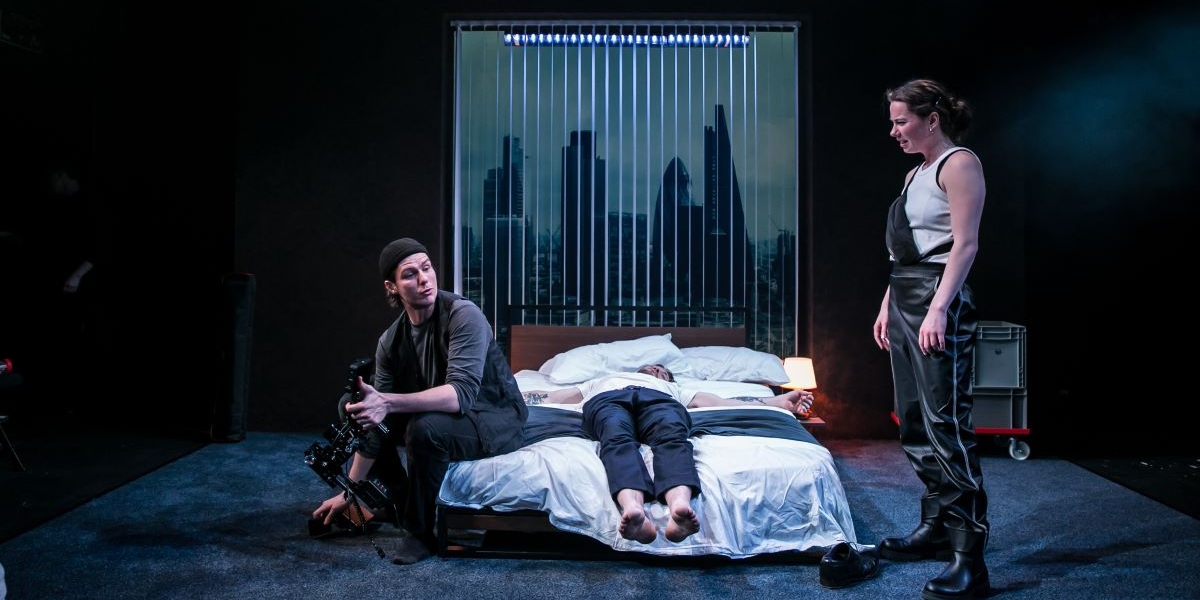‘Snowflakes’ is a discomfiting but important new play that first ran at the Old Red Lion a couple of years ago and now comes for a stint to Park90 with two of the three cast members reprising their roles. Robert Boulton is the author and also takes one of the leads. We find ourselves in a London hotel room full of angles and sleek surfaces, a chilly atmosphere in which Tony (Henry Davis) is groggily waking up after a rough night, and one that clearly at one stage had included company. Room Service arrives, but this is complimentary in the most negative ways imaginable. Marcus (played by Boulton) and Sarah (Louise Hoare) are part of a start-up video revenge team who take people prisoner who have been accused of crimes online and then force them on camera to defend themselves with an online audience determining in a final vote how extensively they will be punished and tortured or even killed.
Tony is duly overpowered, and the rest of the first half is given over to an detailed set up of equipment, much of it potentially gruesome, and the elaboration of the back stories of the three characters. Marcus is a veteran in this apparently profitable business, claiming justification from his previous witnessing of a case of sexual abuse, whereas it is Sarah’s first job out of the office and she appears to have many doubts and hesitations. Some of this exposition, particularly around gender and sexism, is a tad clunky and overlong; but the act ends strongly as Tony revives and begins to push back on his captors, exploiting their differences and arguing for his innocence and right to be heard. It is a major strength of the writing that the interplay of power in these three-way exchanges is fluid and shifting.
The second half is pacier, with several unexpected but satisfying plot twists, which it would not be right to reveal especially in a dark thriller such as this. The violence is handled very realistically – deliberately awkward and clumsy and therefore all the more upsetting; and the use of video camera projection on the curtained window of the room is a simple and very effective device that sharpens the tension. All three actors are faced with considerable challenges, technical and emotional, which they dispatch with skill. There are times where there could be more variation in tone and pace – full-on agression can be tedious as well as unpleasant to watch if sustained too long. But there are plenty of comic moments along the way too, and a particularly fine out-of-body monologue by Davis which eloquently sums up not just the pointless cycle of rhythms of his own life but the ennui of sophisticted urban existence more broadly.
In the course of the evening the action poses many questions that we all need to think about – how far should ‘cancellation’ of unpopular people go? Is online judgement now in danger of superseding the legal process to create a new kind of vigilante justice? Is redemption possible, or are some offences so heinous that the perpetrator must always remain beyond the pale. Perhaps most tellingly, because it connects with so many other contemporary issues, has technology now escaped the boundaries of our own moral capacity to control it and its application to ourselves? These questions are all the more troubling because the play is set not in the present, nor in a distant future, but in a near future that it is all too easy to imagine becoming a reality soon.
Many of the tropes this play exploits will be familiar to devotees of ‘Black Mirror’ and similar series, but they are assembled here in different ways and approached from fresh angles and perspectives. This is not a comfortable, fun night out; but it is undoubtedly an important and thought-provoking one.

